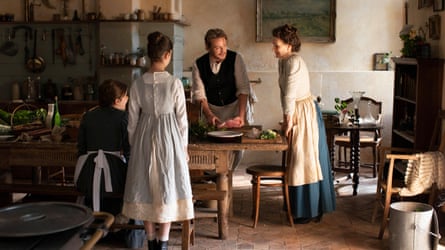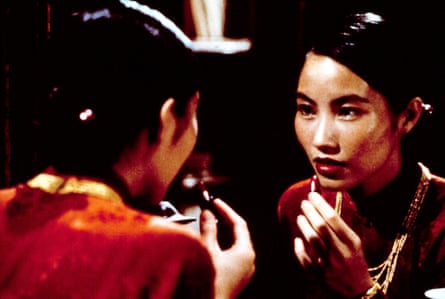T
The current selection of films and TV shows centered around food often focus on conflict and drama – depicting kitchens as battlegrounds and meals being created in the heat of angry arguments. However, the new French film The Taste of Things offers a refreshing departure from these themes seen in works like The Bear or Boiling Point. Instead, director Tran Anh Hung, who was born in Vietnam, presents a more subdued approach in his film – showcasing the beauty of culinary art in a manner reminiscent of beloved food-centric movies such as Babette’s Feast or Eat Drink Man Woman.
In the 1880s, Tran’s award-winning film explores the dynamic between cook Eugénie (played by Juliette Binoche) and her gourmet employer and lover Dodin (played by Benoît Magimel). However, at its core, the film delves into the concept of creativity according to Tran. He explains, “I aimed to create a film centered around art, and I specifically chose food as the medium because it is a tangible form of art. To me, cinema should be a sensual and physical experience.”
During a Zoom call from Ho Chi Minh City, Tran shares about a film where the characters not only enjoy eating, but also take great care in handling their food. Unfortunately, his camera is off due to a poor connection. In beautifully choreographed scenes, Binoche and Magimel can be seen preparing elaborate dishes with real ingredients such as fish, poultry, celeriac, and delicate pastry. Tran claims that it was simple for the actors to cook because he would just give them a chicken or lettuce and they would immediately transform it into something enjoyable.

The French film “The Taste of Things” has a distinct French feel, as it was France’s submission for the Oscars. However, this is intentional as the director, Tran, wanted to explore the significance of food in his adopted country, where he moved at the age of 12. In France, meals are a time for people to come together and not just discuss food, but also culture. In contrast, in Vietnam, meals are not traditionally seen as a time for conversation. Instead, in France, it is common to see parents asking their children about their latest readings while at the table.
Tran also highlights the structured and historical aspect of French food culture. He explains that everything was meticulously defined, from table settings to the number of glasses and forks. This is why Dodin in the movie is referred to as the “Napoleon of the culinary arts” – because he establishes and codifies culinary protocols. In this sense, he is similar to Auguste Escoffier, who formalized modern French cuisine in his 1903 book, Le Guide Culinaire. Prior to this, French recipes were chaotic and difficult to interpret, resembling more of a poem rather than a clear set of instructions.
Along with Escoffier, Tran looked into Brillat-Savarin’s 1825 gastro-philosophical classic The Physiology of Taste, while his on-set consultant was the Michelin three-star chef Pierre Gagnaire. Yet Tran has never cooked much himself, and only since making the film has he really risked venturing behind a stove – and only with French food. “French is less complicated. You have to make a lot of different dishes to build a Vietnamese meal.”
The unique combination of ingredients in The Taste of Things is the pairing of Binoche and Magimel, who were once a real-life couple but have not acted together since 1999. This creates a noticeable on-screen tenderness and mutual respect between their characters, who are mature individuals with a longstanding history. According to Tran, Binoche initially had doubts about the success of this pairing and whether Magimel would accept the role. However, the end result was perfect. Tran also reveals that Magimel brings a sense of vulnerability to his character, as he is faced with a strong woman like Eugénie, played by Binoche. One of Tran’s favorite scenes between the two characters is when they share a simple omelette. In this scene, Eugénie expresses her love for him in a way that he cannot fully comprehend, creating a beautifully nuanced moment.

The director’s latest movie may appear to be a departure from his previous work in Vietnamese dramas, but it aligns closely with his debut film, The Scent of Green Papaya from 1993. Set in 1950s and 60s Saigon, the film follows a young domestic servant who takes delight in the sensory experiences around her, including food. While The Scent of Green Papaya sparked some controversy for romanticizing a woman’s life in servitude, its poetic approach subverts the surface interpretation. Similarly, Tran’s new film, The Taste of Things, has faced criticism for its focus on a woman cooking for her lover and his male friends. However, we also witness Dodin passionately cooking for Eugénie and admiring her as an artist. According to Tran, it is Eugénie who dictates the nature of their relationship.
T
Tran was raised in Laos by his parents who were uniform makers for the French army. In 1975, the family relocated to France due to the impending takeover of Vietnam and Laos by the communists. While in Paris, Tran pursued a degree in cinematography and eventually created The Scent of Green Papaya, where he recreated Saigon’s old charm on a studio set. This film, along with At the Height of Summer which depicted the lives of three sisters in modern Hanoi, solidified Tran’s reputation as a meticulous screen poet. However, his film Cyclo, based on his experiences upon returning to Vietnam in the early 90s, was a raw and intense portrayal of street life in Ho Chi Minh City.
Tran’s wife, Tran Nu Yen Khe, was the main star in his first four films and was known for her captivating presence in 90s art cinema. She has since become his collaborator behind the scenes and is currently the art director for The Taste of Things. The couple, who have a son and daughter in their twenties, are currently in Ho Chi Minh City for an exhibition featuring Yen Khe’s paintings and sculptures. Tran credits his wife for the beauty in his movies and mentions that she is always by his side on set, ensuring that everything is perfect. He recalls meeting her in Paris while he was casting for a short film and it felt like he had discovered Vietnam through her. He also adds that their relationship may have influenced the story of The Taste of Things. Although I cannot see him, I can imagine him smiling as he speaks.
Tran’s recent work, The Taste of Things, showcases a new side of the director as a distinctly French filmmaker. Binoche explains that while he hasn’t abandoned his Vietnamese roots, he has a deep appreciation for the elegance and refinement of French culture, which is reflected in his work. She notes that there are various expressions of French identity, but Tran has found the most sophisticated approach.
Tran is now content to be back in his home country of Vietnam. He finds it to be a peaceful and relaxing place, especially compared to colder countries where he feels tense. Currently, he is working on new projects that are focused on Asian culture, including a Vietnamese all-female drama and a film about Buddha. These projects align with Tran’s preference for precise and visually appealing aesthetics. He believes that many modern movies prioritize narratives over the visual language of cinema. Tran values the power of small details in conveying deep emotions and themes about life. One could say that his films capture the essence and flavor of life.
Source: theguardian.com


